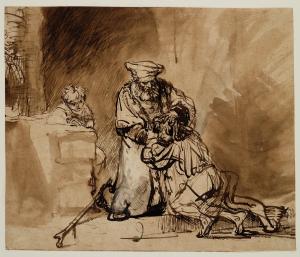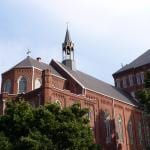
The Second Sunday of the Byzantine Pre-Lent Triodion reminds us of the great and bountiful love of God for humanity by way of the well-known parable of the Prodigal Son. In it, we are told of a man who had two sons. The first stayed with his father. The other went off on his own to pursue his passionate desires in life over and above all other things (including his father):
And he said, “There was a man who had two sons; and the younger of them said to his father, `Father, give me the share of property that falls to me.’ And he divided his living between them. Not many days later, the younger son gathered all he had and took his journey into a far country, and there he squandered his property in loose living” (Lk. 15:11-13 RSV).
The younger son enjoyed himself for as long as his wealth lasted. When his money ran out, he found himself in dire straits. A famine was going through the region. In order to survive, he hired himself out as a servant, working to feed pigs out in the fields. He found that the swine he raised ate and lived better than he did. Contemplating his circumstances, he remembered how his father’s servants were treated better. He decided to try to go back home to hire himself as a servant to his father:
And he arose and came to his father. But while he was yet at a distance, his father saw him and had compassion, and ran and embraced him and kissed him. And the son said to him, `Father, I have sinned against heaven and before you; I am no longer worthy to be called your son.’ But the father said to his servants, `Bring quickly the best robe, and put it on him; and put a ring on his hand, and shoes on his feet; and bring the fatted calf and kill it, and let us eat and make merry; for this my son was dead, and is alive again; he was lost, and is found.’ And they began to make merry (Lk. 15:20-24 RSV).
The elder son was upset. He seemingly had done everything right. He felt his father had rewarded his younger son’s insolence while all the he had done had been ignored. He felt abandoned. But his father’s point was that they should all celebrate the return of his brother to their family. The younger brother was not rewarded for his misdeeds. Rather, he had come back knowing what he had done wrong. He now understood that the inordinate pursuit for pleasure does not satisfy. It can only lead to ruin. The father was happy that his son had changed and was showing him that his love remained, no matter what his son had done. As for the elder son, he still would get what was coming to him:
And he said to him, `Son, you are always with me, and all that is mine is yours. It was fitting to make merry and be glad, for this your brother was dead, and is alive; he was lost, and is found.’ (Lk. 15:31-32 RSV).
The elder son did not understand, and though he did not journey far off to pursue his own pleasure, he still suffered from the same malady as his younger brother. For he was looking after his own selfish desires. He stayed with his father with a hope to receive his father’s blessings and praise, not realizing that he already had it. He was, in many ways, just as dead to his father as his brother, because he had yet to learn that the greatest gift his father gave was his love and it was given out freely. The older son should have realized this; his father was before him, constantly giving him his love. He shouldn’t have the need for any sign to show him that he was loved. But, because he looked at his father just like his younger brother had done before he had left, the older son could not appreciate his younger brother’s return.
The story of the Prodigal Son, therefore, is really the story of two prodigal sons, and the loving father who was capable of holding both in the embrace of his love despite their self-absorption. Both of them had lost their proper relationship with the father. It could be said that both of them were effectively dead to their father because of they did not yet understand their father and the love he offered both of them.
The story can be used to indicate the love that God has for his creation. The Prodigal Son can be seen as representing humanity as it neglected its proper relationship with God. It had asked for its inheritance (the earth) and got it, only to find itself spiritually dead. It was only after realizing the spiritual famine which came as a result of its turning away from God that humanity could return to him. And the Father held out his arm to welcome wayward humanity back, with the Son, Jesus, being that arm: “The Father’s ‘arm’ is the Son, ready to embrace the prodigal son who returns to him.”[1] Thus, St. Ambrose explained:
Yet, it is also possible to understand, here, the likeness of the human race in one man. Adam was, and we were all in him. Adam was lost, and in him all were lost [cf. I Corinthians 15:22]. Man is refashioned in the man who was lost, and he is made in the likeness of God and restored to His image [cf. Genesis 1:27] through Divine patience and magnanimity. [2]
The story, therefore, is the story of all of us. We lost our way. We lost ourselves. We closed ourselves off from the deifying grace of the all-loving God. This means, we have spiritually died and have become less than what we were when we were with God. So long as we do not realize the ramifications of this, we pursue our own inordinate pleasures. The problem is not, of course, the good within the pleasures, but the disordered pursuit of those goods, receiving them in a way which harms us. We have to come to our senses. We have to realize the depths of our perversity, that things are not as they should be. We had to see the famine which the inordinate pursuit of transitory pleasures brings in order to truly desire what we once had and repent. Then we can have the kind of repentance which a Coptic Patriarch of Alexandria, Pope Shenouda III, said is true: “True repentance is a human longing to the origin from which it was taken. It is the desire of a heart that stayed away from God, and felt that it cannot go any further away.”[3]
This ties with the message of Paul in First Corinthians: all things are lawful, all things have some good in them, but not all of them are helpful to us. We must pursue things in their proper place lest we find when we receive them, instead of helping us, they take us far from the good which we desire:
“All things are lawful for me,” but not all things are helpful. “All things are lawful for me,” but I will not be enslaved by anything. “Food is meant for the stomach and the stomach for food” — and God will destroy both one and the other. The body is not meant for immorality, but for the Lord, and the Lord for the body. And God raised the Lord and will also raise us up by his power (1 Cor. 6:12-14 RSV).
All things are good, but only God is the source and foundation of the Good. All things are good, but they are not equally good. If we want the greatest good, we need to return to its source, to God, and receive it from him. For to try to have some good apart from God deprives the good of its foundation, lessening the good which we receive. If we become distracted by some lesser good, and seek after it, we might be able to obtain it, but we will find it does not satisfy us for long. Only the fullness of the Good in and with God can satisfy us forever. When we stray from God, we might enjoy ourselves, like the Prodigal Son, for a short while, but then we will find ourselves void of all that is good. What are we to do? Return to God our Father. And to be with the Father, we must love him and be open to his love.
Just as we should see ourselves in the Prodigal Son, we should also realize we are like his elder brother. Many of us feel as if we have not left God because we are religious. We believe in him. We think we love him. But we pursue him, not out of love, but out of selfish desire. We pursue him for our inheritance. We hope to be rewarded for pursuing him instead of truly loving him. Love does not desire selfish gain, but our pursuit of God is often one which looks for such gain. It is for this reason the Muslim Sufi Rabia said that she wished that the fires of hell would be put out by water, and heaven would be put into flames, so as to point out that it should not be fear of hell, nor desire for the reward for heaven, which should lead us to follow God, but pure love. When we realize this, we can then have the Father and all things through him. And when we realize this, we will also realize we already have had it all because the Father has always been there giving himself to us. The one who has the Father’s love and loves the Father back has all things in the Father, but the one who wants some reward from the Father have already lost sight of what they have and have lost themselves and so need to repent and turn back to the Father with love.
Thus, the story of the Prodigal Son is the story of the Loving Father who is always there, giving his love to his children. Jesus told it to make sure we realize, no matter what we have done, no matter how far we have journeyed away from God, we can return and he will be there, ready to receive us. Once we come back to him, we will find he is there, with his arm (Jesus) out, ready to embrace us, welcoming us back home. Then we will receive all things in and through him and his boundless love. The story of the Prodigal Son is a story of hope. It is a story of love. It is our story, telling us God is willing to give us everything and we can have it all if only we turn back to him in love.
[1] St. Anthony of Padua, Sermons for Sundays and Festivals. Volume IV. trans. Paul Spilsbury (Padua: Edizioni Messaggero Padova, 2010), 118.
[2] St. Ambrose, Exposition of the Holy Gospel According to Saint Luke. Trans. Theodosia Tomkinson (Etna, CA: Center for Traditionalist Orthodox Studies, 2003), 329.
[3] Pope Shenouda III, The Life of Repentance and Purity. Trans. Nabil Guirgis (Sydney, Australia: Coptic Orthodox Publication and Translation, 1990), 2.
Stay in touch! Like A Little Bit of Nothing on Facebook.
If you liked what you read, please consider sharing it with your friends and family!













